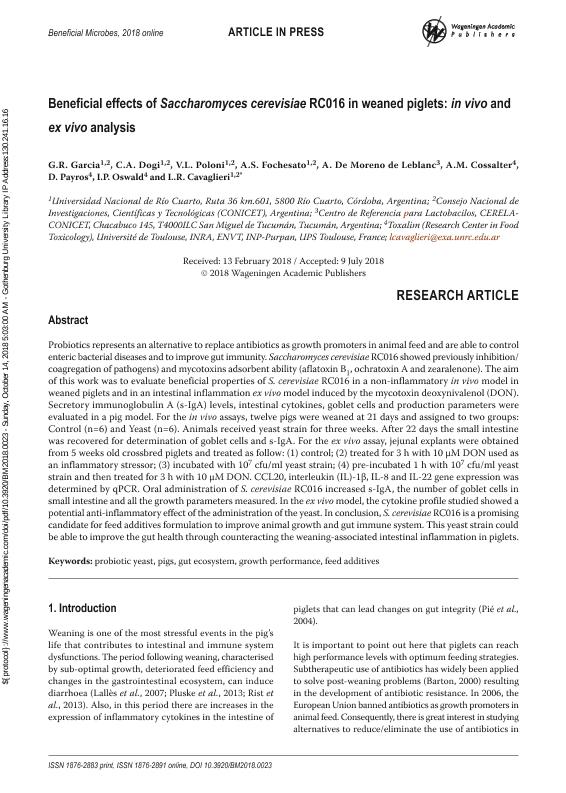Mostrar el registro sencillo del ítem
dc.contributor.author
García, Gisela Romina

dc.contributor.author
Dogi, Cecilia Ana

dc.contributor.author
Poloni, Valeria Lorena

dc.contributor.author
Fochesato, Analía Silvia

dc.contributor.author
de Moreno, Maria Alejandra

dc.contributor.author
Cossalter, Anne Marie
dc.contributor.author
Payros, Delphine
dc.contributor.author
Oswald, Isabelle P.
dc.contributor.author
Cavaglieri, Lilia Reneé

dc.date.available
2020-01-24T18:54:06Z
dc.date.issued
2018-10
dc.identifier.citation
García, Gisela Romina; Dogi, Cecilia Ana; Poloni, Valeria Lorena; Fochesato, Analía Silvia; de Moreno, Maria Alejandra; et al.; Beneficial effects of saccharomyces cerevisiae RC016 in weaned piglets: In vivo and ex vivo analysis; Wageningen Academic; Beneficial Microbes; 10; 1; 10-2018; 33-42
dc.identifier.issn
1876-2883
dc.identifier.uri
http://hdl.handle.net/11336/95781
dc.description.abstract
Probiotics represents an alternative to replace antibiotics as growth promoters in animal feed and are able to control enteric bacterial diseases and to improve gut immunity. Saccharomyces cerevisiae RC016 showed previously inhibition/ coagregation of pathogens) and mycotoxins adsorbent ability (aflatoxin B1, ochratoxin A and zearalenone). The aim of this work was to evaluate beneficial properties of S. cerevisiae RC016 in a non-inflammatory in vivo model in weaned piglets and in an intestinal inflammation ex vivo model induced by the mycotoxin deoxynivalenol (DON). Secretory immunoglobulin A (s-IgA) levels, intestinal cytokines, goblet cells and production parameters were evaluated in a pig model. For the in vivo assays, twelve pigs were weaned at 21 days and assigned to two groups: Control (n=6) and Yeast (n=6). Animals received yeast strain for three weeks. After 22 days the small intestine was recovered for determination of goblet cells and s-IgA. For the ex vivo assay, jejunal explants were obtained from 5 weeks old crossbred piglets and treated as follow: (1) control; (2) treated for 3 h with 10 μM DON used as an inflammatory stressor; (3) incubated with 107 cfu/ml yeast strain; (4) pre-incubated 1 h with 107 cfu/ml yeast strain and then treated for 3 h with 10 μM DON. CCL20, interleukin (IL)-1β, IL-8 and IL-22 gene expression was determined by qPCR. Oral administration of S. cerevisiae RC016 increased s-IgA, the number of goblet cells in small intestine and all the growth parameters measured. In the ex vivo model, the cytokine profile studied showed a potential anti-inflammatory effect of the administration of the yeast. In conclusion, S. cerevisiae RC016 is a promising candidate for feed additives formulation to improve animal growth and gut immune system. This yeast strain could be able to improve the gut health through counteracting the weaning-associated intestinal inflammation in piglets.
dc.format
application/pdf
dc.language.iso
eng
dc.publisher
Wageningen Academic
dc.rights
info:eu-repo/semantics/openAccess
dc.rights.uri
https://creativecommons.org/licenses/by-nc-sa/2.5/ar/
dc.subject
FEED ADDITIVES
dc.subject
GROWTH PERFORMANCE
dc.subject
GUT ECOSYSTEM
dc.subject
PIGS
dc.subject
PROBIOTIC YEAST
dc.subject.classification
Otras Ciencias Biológicas

dc.subject.classification
Ciencias Biológicas

dc.subject.classification
CIENCIAS NATURALES Y EXACTAS

dc.title
Beneficial effects of saccharomyces cerevisiae RC016 in weaned piglets: In vivo and ex vivo analysis
dc.type
info:eu-repo/semantics/article
dc.type
info:ar-repo/semantics/artículo
dc.type
info:eu-repo/semantics/publishedVersion
dc.date.updated
2019-12-11T20:18:00Z
dc.identifier.eissn
1876-2891
dc.journal.volume
10
dc.journal.number
1
dc.journal.pagination
33-42
dc.journal.pais
Países Bajos

dc.journal.ciudad
Wageningen
dc.description.fil
Fil: García, Gisela Romina. Consejo Nacional de Investigaciones Científicas y Técnicas. Centro Científico Tecnológico Conicet - Córdoba; Argentina. Universidad Nacional de Río Cuarto; Argentina
dc.description.fil
Fil: Dogi, Cecilia Ana. Consejo Nacional de Investigaciones Científicas y Técnicas. Centro Científico Tecnológico Conicet - Córdoba; Argentina. Universidad Nacional de Río Cuarto; Argentina
dc.description.fil
Fil: Poloni, Valeria Lorena. Consejo Nacional de Investigaciones Científicas y Técnicas. Centro Científico Tecnológico Conicet - Córdoba; Argentina. Universidad Nacional de Río Cuarto; Argentina
dc.description.fil
Fil: Fochesato, Analía Silvia. Consejo Nacional de Investigaciones Científicas y Técnicas. Centro Científico Tecnológico Conicet - Córdoba; Argentina. Universidad Nacional de Río Cuarto; Argentina
dc.description.fil
Fil: de Moreno, Maria Alejandra. Consejo Nacional de Investigaciones Científicas y Técnicas. Centro Científico Tecnológico Conicet - Tucumán. Centro de Referencia para Lactobacilos; Argentina
dc.description.fil
Fil: Cossalter, Anne Marie. Institut National de la Recherche Agronomique; Francia. Université de Toulouse; Francia
dc.description.fil
Fil: Payros, Delphine. Institut National de la Recherche Agronomique; Francia. Université de Toulouse; Francia
dc.description.fil
Fil: Oswald, Isabelle P.. Institut National de la Recherche Agronomique; Francia. Université de Toulouse; Francia
dc.description.fil
Fil: Cavaglieri, Lilia Reneé. Universidad Nacional de Río Cuarto; Argentina. Consejo Nacional de Investigaciones Científicas y Técnicas. Centro Científico Tecnológico Conicet - Córdoba; Argentina
dc.journal.title
Beneficial Microbes
dc.relation.alternativeid
info:eu-repo/semantics/altIdentifier/url/https://www.wageningenacademic.com/doi/10.3920/BM2018.0023
dc.relation.alternativeid
info:eu-repo/semantics/altIdentifier/doi/http://dx.doi.org/10.3920/BM2018.0023
Archivos asociados
